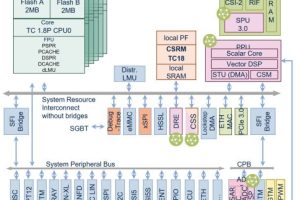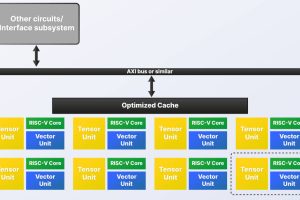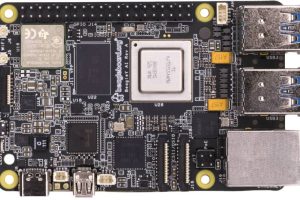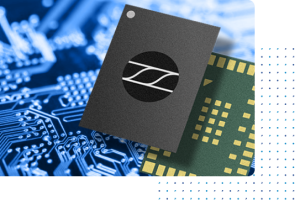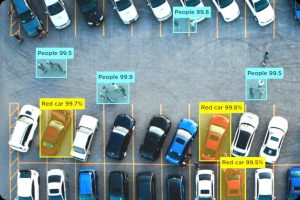Infineon has had its forthcoming TC4x automotive microcontrollers cleared for safe AI processing by the Fraunhofer Institute for Cognitive Systems (IKS). “Embedded AI is becoming increasingly important for safety-critical real-time applications,” said Infineon. “However, this also creates new requirements and standards that must be considered during the complete product lifecycle.” The TC4x family includes ‘PPU’ (parallel processing unit), an AI-accelerator ...
AI
The support or use of AI (artificial intelligence) in electronics, including ML (machine learning), whether in software (supervised, unsupervised or reinforcement learning tools) or hardware (accelerators, GPUs, etc).
Blackwell proposes “intriguing times”
The introduction of the Blackwell platform generated a lot of interest but also some searching questions. Electronics Weekly spoke to Keith Townsend, global technology advisor for the Futurum Group who reflected on Nvidia‘s announcement of its Blackwell platform and its leap in performance. “These are intriguing times,” he said. The announcement of Blackwell makes for interesting conversation around scale. Blackwell ...
Semidynamics proposes modular RISC-V architecture for scalable AI processing
Barcelona-based Semidynamics is aiming at next-generation AI chips and algorithms such as transformer with intellectual property called ‘All-In-One AI’. Rather than having on the same IC a multi-core CPU, a multi-core GPU for vector processing and a multi-core neural processor for tensor processing, it is advocating multiple instances of a block consisting of one out-of-order 64bit RISC-V CPU, one (GPU-like) ...
US and UK sign AI safety MoU
The U.S. and UK have signed an MoU which will see them work together to develop tests for the most advanced AI models, following through on commitments made at the AI Safety Summit last November. Signed by U.S. Commerce Secretary Gina Raimondo and UK Technology Secretary Michelle Donelan (pictured), the partnership will see both countries working to align their scientific ...
Accelerated RISC-V core optimised for edge AI and cryptography
Red Semiconductor has announced RISC-V instruction set extensions, and a hardware design, for edge AI and cryptography in asics and FPGAs. The hardware, called ‘VISC’, is an accelerated RISC-V core that “optimises complex mathematical algorithms for parallel execution in its reconfiguration hardware engine”, according to Red, which claims: “The VISC ISA [instruction set] enables developers to describe complex algorithms in ...
BeagleBoard puts 4Top/s AI processor in Raspberry Pi form factor
The BeagleBoard organisation has introduced a 4Top/s-capable AI processor in Raspberry Pi form factor, built around a Texas Instruments AM67A vision processor. Called a link to suitable Debian XFCE Linux distribution, it “AM67A features a quad-core 64bit Arm CPU subsystem, two general-purpose DSPs and matrix-multiply-accelerators, GPU, vision and deep learning accelerators, and multiple Arm Cortex-R5 cores for low-latency GPIO control”, ...
TeraSignal adds photonics IC for scaling AI bandwidth in datacentres
TeraSignal, the photonics specialist, has announced an intelligent re-driver device for scaling AI bandwidth in data centers. The TS8401/02 intelligent 400G (4x100G) PAM4 modulator driver claims to be the industry’s first CMOS IC with digital link training and link monitoring for 800G linear pluggable optical (LPO) modules. “TeraSignal’s intelligent CMOS solution for LPO modules redefines high-speed interconnects, merging low latency and ...
Korean AI startups chase Nvidia
Rebellions and Sapeon are two fabless chip companies in Korea founded to design AI chips. Rebellions Three year-old Rebellions raised $128 million in its recent Series B funding round. The CEO, Sunghyun Park (pictured), worked for Morgan Stanley and Starlink after getting a PhD at MIT. The company is working with Samsung Foundry on the design and packaging of a ...
Nvidia packages inference to deliver generative AI for healthcare
Optimised packages of AI models and workflows with API have been packaged as NIMs (Nvidia Inference Microservices) which developers can use as building blocks to develop generative AI for healthcare, from drug discovery, med-tech and digital health products. Nvidia announced 25 NIMs at its developer conference, GTC 2024, offering advanced imaging, natural language and speech recognition, digital biology generation, prediction ...
Run Nvidia Tao-developed AI vision models on non-Nvidia Arm hardware
Custom vision-based AI software created on Nvidia’s Tao tool set can be run on Arm based Cortex-M, Cortex-A and Ethos-U microcontrollers according to Edge Impulse, which teamed up with Nvidia to create the work-flow. “Engineers can create computer vision models that can be deployed to hardware including NXP I.MXRT1170, Alif E3, STMicro STM32H747AI and Renesas CK-RA8D1,” according to Edge Impulse. ...
 Electronics Weekly Electronics Design & Components Tech News
Electronics Weekly Electronics Design & Components Tech News
